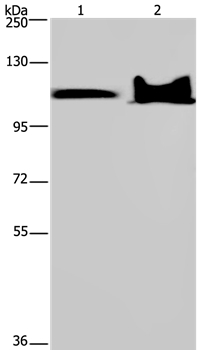
Gel: 6%SDS-PAGE, Lysate: 40 ug, Lane 1-2: Mouse heart tissue, Mouse brain tissue, Primary antibody: CSB-PA858652(KDM4C Antibody) at dilution 1/800, Secondary antibody: Goat anti rabbit IgG at 1/8000 dilution, Exposure time: 1 minute
KDM4C Antibody
CSB-PA858652
ApplicationsWestern Blot, ELISA
Product group Antibodies
ReactivityHuman, Mouse
TargetKDM4C
Overview
- SupplierCusabio
- Product NameKDM4C Antibody
- Delivery Days Customer20
- ApplicationsWestern Blot, ELISA
- CertificationResearch Use Only
- ClonalityPolyclonal
- ConjugateUnconjugated
- Gene ID23081
- Target nameKDM4C
- Target descriptionlysine demethylase 4C
- Target synonymsGASC1, JHDM3C, JMJD2C, TDRD14C, lysine-specific demethylase 4C, JmjC domain-containing histone demethylation protein 3C, [histone H3]-trimethyl-L-lysine(9) demethylase 4C, gene amplified in squamous cell carcinoma 1 protein, jumonji domain-containing protein 2C, lysine (K)-specific demethylase 4C, tudor domain containing 14C
- HostRabbit
- IsotypeIgG
- Protein IDQ9H3R0
- Protein NameLysine-specific demethylase 4C
- Scientific DescriptionThis gene is a member of the Jumonji domain 2 (JMJD2) family and encodes a protein with one JmjC domain, one JmjN domain, two PHD-type zinc fingers, and two Tudor domains. This nuclear protein functions as a trimethylation-specific demethylase, converting specific trimethylated histone residues to the dimethylated form. Chromosomal aberrations and increased transcriptional expression of this gene are associated with esophageal squamous cell carcinoma. Alternative splicing results in multiple transcript variants.
- ReactivityHuman, Mouse
- Storage Instruction-20°C or -80°C
- UNSPSC41116161





![IHC-P analysis of colon tissue using GTX84280 KDM4C antibody [5B9]. Antigen retrieval : Heat-induced epitope retrieval by 10mM citrate buffer, pH6.0, 100oC for 10min. Dilution : 1:50](https://www.genetex.com/upload/website/prouct_img/normal/GTX84280/GTX84280_2538_IHC-P_w_23061420_796.webp)
